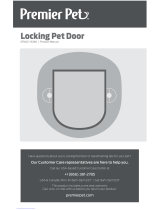
19
Place the exterior frame on the exterior side of the door, fitting
it over the tunnel of the interior frame. Make sure the exterior
frame is level.
Holding both frames in place, insert screws through the holes
in the exterior frame, through the cutout opening, and into the
holes on the back of the exterior frame.
Choose the screws that best fit the thickness of your door. If
your door is:
• Less than 1 inch thick, use the 1 9/16-inch (40 mm) screws.
• Between 1 inch and 2 1/4 inches thick, use the 3 5/32-inch
(80 mm) screws.
Using a manual #2 Phillips (crosshead) screwdriver, tighten the
screws just until the frames are attached.
Check the position of the pet door and adjust it if needed. It
should be resting on the spacer, centered horizontally in the
opening, and level.
Once you are satisfied that the pet door is positioned correctly,
finish tightening the screws. Do not overtighten.
Reinstall the batteries in the pet door.
Verify that the pet door is recognizing your pets’ Pet Door
Keys or microchips as they pass near the door. Once you
are satisfied your pet door is operating correctly, proceed to
“Complete the door installation” on page 20.
If the pet door sensor does not reliably respond to your pet’s
microchip or Pet Door Key, the metal in your door may be
interfering with the operation of the sensor. If this is the case,
you will need to increase the space between the pet door
and the metal in your door by reinstalling the pet door with
a larger cutout opening and SmartDoor™ Connected Pet
Door Installation Adaptors (sold separately). Step-by-step
instructions for this installation are provided in the guide that
comes with the installation adaptors.
3 4
5
























